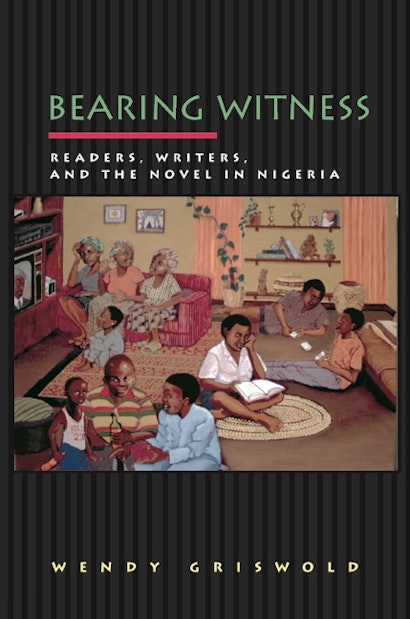Greed, frustrated love, traffic jams, infertility, politics, polygamy. These—together with depictions of traditional village life and the impact of colonialism made familiar to Western readers through Chinua Achebe’s writing—are the stuff of Nigerian fiction. Bearing Witness examines this varied content and the determined people who, against all odds, write, publish, sell, and read novels in Africa’s most populous nation.
Drawing on interviews with Nigeria’s writers, publishers, booksellers, and readers, surveys, and a careful reading of close to 500 Nigerian novels—from lightweight romances to literary masterpieces—Wendy Griswold explores how global cultural flows and local conflicts meet in the production and reception of fiction. She argues that Nigerian readers and writers form a reading class that unabashedly believes in progress, rationality, and the slow-but-inevitable rise of a reading culture. But they do so within a society that does not support their assumptions and does not trust literature, making them modernists in a country that is simultaneously premodern and postmodern.
Without privacy, reliable electricity, political freedom, or even social toleration of bookworms, these Nigerians write and read political satires, formula romances, war stories, complex gender fiction, blood-and-sex crime capers, nostalgic portraits of village life, and profound explorations of how decent people get by amid urban chaos. Bearing Witness is an inventive and moving work of cultural sociology that may be the most comprehensive sociological analysis of a literary system ever written.
Awards and Recognition
- Winner of the 2002 Best Book Award
Wendy Griswold is joint Professor of Sociology and English and Comparative Literature at Northwestern University. She is the author of Renaissance Revivals: City Comedy and Revenge Tragedy in the London Theatre, 1576-1980 and Cultures and Societies in a Changing World as well as coeditor of Literature and Social Practice and Places within, places beyond: the question of Norwegian regionalism in literature.
"By using extensive interviews with publishers, booksellers, and readers, along with surveys and her own insights into the novels, Griswold offers on of the few truly comprehensive views of the world of literature in Africa. It is also a wonderfully optimistic book that suggests the vitality of the written word in contemporary Nigerian life."—Choice
"Griswold wears her learning lightly, using footnotes to show broader debates, keeping her text uncluttered. . . . Bearing Witness provides a useful counterbalance to much detached, contemporary literary criticism; it demonstrates the needs for novels to be examined by scholars from a variety of disciplines."—James Gibbs, World Literature Today
"It is rare to find an American scholar so committed to and successful in melding the approaches of the social sciences and the humanities as Griswold does."—Vera Zolberg, American Journal of Sociology
"To those readers who have explicit memories of Nigeria, whether good or not so good: Please read Wendy Griswold's Bearing Witness. And likewise to those who have never been to Nigeria: please read Grisworld's book. In other words, for anyone with an interest in historical political, cultural, and literary development in Nigeria (and Africa in general), Bearing Witness is a very good book."—Glen Bush, African Studies Review
"This is a major project that will confirm Wendy Griswold's status as one of the premier sociologists of literature working today. It is singular in the way it systematizes and enriches our understanding of the context in which literature is produced and how context shapes the content of the work. That Griswold does this for Africa is even more remarkable.... That Nigeria is the most populous African country with one of the most lively literary cultures makes the book even more significant for our understanding of intellectual production in cultural peripheries. This topic is likely to become increasingly important as we become more aware of the impact of globalization processes on national cultures."—Michèle Lamont, Princeton University

